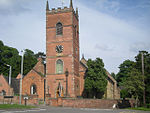Gospel End

Gospel End is a village in the South Staffordshire district of Staffordshire, England. Population details taken at the 2011 census can be found under Himley. It is situated on the A463 road, between Sedgley and Wombourne. It was historically part of the ancient manor of Sedgley, becoming part of the Sedgley urban district in 1894, remaining part of this authority until 1966, when it became part of the Seisdon Rural District in 1966, despite the bulk of Sedgley being absorbed into Dudley County Borough. This in turn was replaced by the South Staffordshire District in 1974. However, it still has a Sedgley DY3 postcode. The main entrance to the Baggeridge Country Park, opened in the early 1980s on the site of the former Baggeridge Colliery, is situated to the west of the village. Also in the village was the original works (and former headquarters) of Baggeridge Brick, finally part of Wienerberger AG, which by 2012 had closed down as the factory's owners agreed a deal with David Wilson Homes to build a new housing estate on the site. The factory buildings were demolished but the iconic brick chimney was retained, being a local landmark and one of the last of its kind to remain locally. Construction of the new estate began in 2014 and the first houses were occupied by the spring of 2015, with the estate being almost complete by 2018. Commercial units and a care home have also been developed there. The focal point of the village is the Summer House, a public house in the east of the village, which was built in the early 19th century. The building has since been expanded.Until 1986, the village had a regular hourly bus service 564 between Sedgley and Wolverhampton via Penn Common. However this service was deemed not commercially viable and was operated by a succession of operators under contract to Staffordshire County Council to a gradually reduced frequency. The last regular service, operated by Arriva Midlands, was withdrawn due to lack of use. On 1 August 2020, The Green Bus reintroduced a bus service 582 through the village on Saturdays only between Wolverhampton and Kidderminster via Wombourne and Penn on a commercial basis. This shoppers service ceased on 30 August 2020. Gospel End is now connected to Wombourne, Sedgley and surrounding villages by the 'South Staffordshire Link', a minibus running Thursday only and which requires advance booking. This service is only available for those unable to use normal services. The community of Gospel End is not served by any schools, with school aged children living there mostly attending schools in neighbouring Wombourne, Sedgley or Wolverhampton.
Excerpt from the Wikipedia article Gospel End (License: CC BY-SA 3.0, Authors, Images).Gospel End
Baggeridge Close, South Staffordshire Himley
Geographical coordinates (GPS) Address Nearby Places Show on map
Geographical coordinates (GPS)
| Latitude | Longitude |
|---|---|
| N 52.540555555556 ° | E -2.1477777777778 ° |
Address
Baggeridge Close
Baggeridge Close
DY3 4AJ South Staffordshire, Himley
England, United Kingdom
Open on Google Maps






